- Home
- S. E. Lynes
The Women: A gripping psychological thriller Page 2
The Women: A gripping psychological thriller Read online
Page 2
‘Aiuto!’ she cries to them. ‘Ambulanza! Someone call an ambulance!’
Two
London, October 2016
Samantha Frayn sees Professor Bridges before he sees her. At least, that is how she will recall it later, in the light of everything that happens. But for now, nothing has happened, and all she can see is him. He is drinking red wine from a plastic cup on the far side of the English department foyer. His hair is a deep chestnut brown. He is slim. He dresses well – how she imagines an American academic might dress: soft blues, fawns, tan brogues. Would risk a burgundy V-neck, possibly has tortoiseshell glasses in a case in his breast pocket, though Marcia would say this was Samantha’s whole Gregory Peck thing. She knows Professor Bridges teaches art history, here at University College, London. She knows he drives an old midnight-blue Porsche. And she knows that most of the female student population would give their last tenner for one look from him. Right now, he is talking to a girl from the year below Samantha. The girl laughs, knees sinking, looking down at the floor, only to glance up again. And there, look: she’s tucking a loose strand of honey-streaked hair behind her right ear, better to expose her perfectly flushed cheek.
The thumb of jealousy in Samantha’s chest is a surprise. Ridiculous.
There are about seventy people here. It is the beginning of term; autumn’s nip is in the air. She misses the Yorkshire countryside in all its colours, the wellington boots in the stone porch, the smell of damp soot in the chimney stack, though these things haven’t been part of her life for a long time now. Around her, chatter amplifies against the hard surfaces, brings her back to herself. She should move, mingle. She should at least smile. If Marcia were here, she would have got them both a drink by now. But Marcia has a hangover and is watching I’m a Celebrity … back at the flat.
Samantha glances towards the door; beyond, to the lifts. She could go, actually. She could just leave. It’s not like she’s interested in any of these people. Well, if you don’t count one, and he is miles out of her league. Yes, go – turn and wander away, back into anonymity, onto the Tube. She could be in Vauxhall by—
‘I took a chance and brought red,’ a man’s voice behind her says.
She startles, turns, finds herself looking into fathomless brown eyes, crinkled at the edges: the eyes of Professor Bridges. Oh God.
‘Ah,’ is all she finds to say – more of a noise than a word – fighting the heat that is climbing up her neck. She did not see him cross the room.
‘I’m Peter.’ He presses a plastic beaker into her hand. His lips are dark pink, the bow almost pointed, defined even against his weathered skin. The wine is warm, like blood. ‘You’re not first year, are you?’
‘Final,’ she says. ‘I’m Samantha.’ She offers her hand, which he shakes.
‘Pleased to meet you, Samantha.’ His hand is warmer than the wine.
‘You too.’
He takes a slug of his drink, grimaces as if offended. ‘Christ, the wine at these things is awful, isn’t it?’
‘Oh my God, yes.’ Samantha rolls her eyes. Not that she’s tasted better. Or worse. She really has no idea about these things; she’s just trying to somehow throw a ring fence around the two of them, make some sort of lightning intimate connection.
‘I’m not supposed to be here,’ he says, glancing about before returning his gaze to her, as if the others are of no interest. ‘I’m an interloper, strictly speaking.’
‘Careful,’ she says. ‘You might get caught.’
He raises one eyebrow, as if surprised, before throwing her a suggestive smirk.
‘Let’s hope so.’
The quip goes right through her; her belly folds over. She has fantasised about a moment like this, but now that it is here, she has to look away. It’s actually a bit embarrassing. A bit stressful. In her fantasies, she is much more self-possessed.
She manages to get herself together enough to look up. He is nodding towards the crowd, to someone; she doesn’t see who.
‘I’m good mates with Sally,’ he says. ‘She got me on the guest list.’
Guest list is ironic, Samantha gets that. It’s not like this is some trendy club. She wonders if Sally is the young girl he was talking to, before realising that, doh, of course he means Professor Bailey.
‘Head of English,’ he adds, as if reading her mind, his pink mouth turning up at one side.
‘Yes, yes,’ she says. ‘I mean, yes, I know who you mean. You’re … you’re history of art, aren’t you?’ Her face burns. Shit. In her surprise, she has revealed her hand.
But it isn’t, apparently, a disaster. At least, his smile tells her it isn’t. His teeth are even, creamy, a neat lacing of gum. He takes another sip of the terrible wine, his mouth immediately puckering. Beside them, a group of students from her year let out an excited shriek. She winces with embarrassment on their behalf. I am not like them, she wants to say. But can’t, of course; that would be lame.
But he must pick up on exactly what she’s thinking because he widens his eyes, leans towards her and whispers in her ear, ‘What an amazingly exciting conversation they must be having.’
Oh my God, the telepathy! She giggles, tries to choose a spot on the floor, fixes on her DM boots, wonders if he finds them childish, finds her childish. She doesn’t want him to find her childish, not nerdy and shrieking like the others. She wants, she realises, to appear older. When she’s seen Professor Bridges around, in the uni cafeteria sometimes, she’s put him in his late thirties, maybe as old as forty, but she wonders now how old he actually is, how much older than her. How much more experienced. It is not a question she can ask, nor does she, because he is lifting her beaker from her hand.
‘Listen, shall we go and get a better drink somewhere quieter?’ In his eyes there is no doubt, none whatsoever. It is as if he is saving her from something, as if he is teasing a bottle of cheap cider from the grimy hands of a homeless person and offering to take them to a hostel for the night. He knows she is not like the others. He’s identified this in her. That’s why he came over. He wrinkles his nose and she knows exactly what he means. ‘I’ll put these back, shall I?’
No objection makes it even as far as her throat. Why would it? He has chosen her. He, Professor Bridges, has chosen her, Samantha Frayn, a nobody with knobbly knees and flyaway dandelion hair. Out of all these rosy girls who know how to tuck their thick, shiny hair just so behind their ear, how to laugh on sinking knees when he hits them with that laid-back irony, he has chosen her. With no real preamble, no small talk. He has seen that she’s someone who can ignore the petty, wheedling internal voice of reason, who is not afraid to rise to life’s impetuous moments and meet them square on. Someone who can understand someone like him with no real need for words. Shall we go and get a better drink somewhere quieter?
Er, yes.
She watches him return the wine. The crowd parts for him. Girls throw sideways glances, meet each other’s eye with almost imperceptible smiles. His blazer is smart, too smart for an academic, his deep blue trousers the perfect length against his tan brogues. At the back of his head is the hint of a bald spot, no bigger than a ten-pence piece. He has combed his hair over it and she thinks about him doing that – the secret vanity, the vulnerability in the act – patting the hair down with his hand, maybe using a second mirror to check it’s covered. She has no idea what she has said or done to make him choose her, knows only that he has, and that possibly he intends to seduce her – properly, calmly, like a man. The thought fills her with a precipitous sensation. She is unbalanced, falling, the cave of her chest flaring with anxiety.
He is standing in front of her. His smile almost makes her panic.
‘Let’s go,’ he says.
His Porsche is parked on Gordon Square. He unlocks the passenger-side door, which he holds open.
‘No central locking,’ he says as she lowers herself onto the cream leather seat. ‘Makes me appear much more chivalrous than I am.’
Chivalry is
a sexist anachronism, she so doesn’t say. What she says instead is, ‘Don’t Porsches usually have, like, a fin thing on the back?’
‘Like a fin thing?’ he teases before strolling around to his side and getting in. His cologne smells expensive, a little like wet grass. ‘This is a 1985 Porsche Carrera Coupé M491. No spoiler. No like a fin thing. I’ve had her a long time.’
‘Was she new when you bought her? It, I mean. I mean the car.’
He laughs. Her face heats yet again. If Marcia could see her right now, she would freak.
‘Just how old do you think I am?’ Still chuckling, he starts the ignition. The engine gives a throaty growl. ‘She was second-hand when I bought her. Now she’s vintage.’ He glances at Samantha when he says this, and his brown eyes twinkle – oh my God, the cliché of it, the actual cliché. She imagines telling Marcia later – or tomorrow! Marcia, she will say, I know this is a cringe, but his eyes actually twinkled.
‘And which are you?’ she dares to ask. ‘Old or vintage?’
He grins, his canine teeth a little raised against the others. ‘I’d say I’ve had a few too many careful owners.’
Cheesy, she thinks, but laughs despite herself as he pulls out into the city traffic. The pinkish blue of dusk has darkened to soft navy. White headlights flash and fade; red tail lights lure them forward.
‘Where are we going?’ she asks.
‘Anywhere you want. There’s a little pub I know not too far away. It’s in Soho. Used to be … well, not a brothel exactly, but it’s an old prostitutes’ hang-out and it still has the original booths, which back then had curtains you could pull across when you were … you know, busy.’ He glances at her, returns his eyes to the busy street. ‘London pubs have such great history and some of them are beautifully maintained.’ With the palm of one hand he spins the steering wheel, heads left towards Tottenham Court Road. ‘And most of them serve a passable red.’
A passable red. Lol. The urge to giggle itches at her throat. She would text Marcia right now, but he would see.
Soho is dense with bodies. The car gives a low thrum as it slows to walking pace. He appears not to notice, asks her which modules she’s studying.
‘Eighteenth century,’ she tells him. ‘The Romantics and an option on Icelandic literature.’
‘So, Pope?’ he says. ‘Addison, Fielding et al.?’
She laughs. Like all academics, his breadth of learning is intimidating, as if he has an entire library index stored in his head.
‘Sheridan, Goldsmith,’ she says. ‘Loads. There’s loads of reading.’
‘Loads.’ He gives a brief chuckle, though she’s not sure why. ‘You’d expect that, wouldn’t you? Reading English? Clue in the verb there.’ That laid-back irony again, the gentle tease of it. They are circling now around the packed Soho streets. Sharp-suited men and chic city women dawdle across the road without looking, spill from the doors of bars and restaurants she can’t imagine ever being able to afford.
‘Chaucer?’ he asks, turning right into Frith Street for the second time.
‘That was last year. It’s all Vikings this year. Eddas and sagas and all that.’ She is downplaying her knowledge so as not to appear too up herself. She hopes this will make her seem more intelligent. A double bluff, that’s what she’s going for. That’s the idea, anyway.
The car stops. In front is a pushbike rickshaw, a polite chaos of pedestrians.
‘Human traffic.’ She frowns wisely. This time, an attempt to appear worldly, like someone who knows about these things.
He too frowns, mirroring her. ‘This is hopeless, isn’t it? Thursday’s the new Friday; I didn’t think it would be so busy.’ He adjusts his position, leans against the steering wheel; one arm stretches over the back of his seat. He is looking at her. He is looking right at her. ‘Tell you what, seeing as you’re such a fan of all things vintage, why don’t we blow the dust off one of my bottles of red, pour it into some decent glassware and talk where it’s quiet and calm? If you don’t object, that is.’
Oh my God. This is it. And so much better than Hey, I’ve got some cans in my room if you want.
‘I don’t object,’ she says, attempting a small shrug.
‘Fantastic.’ He settles back into the driving seat, pushes his index finger to the stereo. Soft music fills the car. She thinks about her flat in Vauxhall. Marcia is literally going to die when she hears about this. She reaches into the footwell for her bag, but then remembers that Peter threw it onto the back seat. She should definitely text Marcy, let her know she won’t be back, possibly not until tomorrow – eek. She’ll do it when she gets to his place. Definitely. Oh my God, she doesn’t know what the hell she’s doing, why she’s in this car. And yet she does know; she totally, completely knows.
From the stereo Marvin Gaye asks, ‘What’s going on?’
Too right, she thinks. What is going on?
He lives in Richmond, it turns out. For some reason, she’d assumed that he lived in the centre. But no, they drive for around an hour and she feels the city recede behind them, give way to lower buildings, darker, lonelier streets.
His house is a Georgian mid-terrace. She doesn’t phrase it like this to herself, doesn’t know that this is what it is; it is he who tells her as he unlocks the door, who told her a moment ago that they were in Richmond Hill, pointing out the kink in the Thames, the dark cloud of trees in Marble Hill.
‘My father left the house to me when I was in my late twenties,’ he says as they step inside. ‘Along with a bit of money, which I used to fund a move from secondary-school teaching to university. I bought time, essentially.’ He gestures for her to go ahead, into the hall. ‘Time is expensive.’
‘Your mother?’ she asks, placing her coat into his waiting hands.
‘She died when I was twelve. The big C, I’m afraid. You’re not a smoker, are you?’
She shakes her head, as if shocked by the very idea. No need to mention binge-smoking Marcia’s roll-ups on drunken nights out, the odd packet of menthols.
‘Good.’ He indicates a door further up, on the left. ‘Go through to the living room.’
The hallway is wide. Her Docs squeak on the black and white diagonal squares. Her shoes are clean, at least, though she wonders if she should have taken them off at the door. Too late. She passes beneath an arch. Two plaster faces stare down at her: one angel, smiling; one devil, leering. Then a door on the right beneath the staircase. A moment later, she senses him behind her, turns in time to see him disappear into the dimness beyond. A wine cellar, must be. Oh my God, he wasn’t even joking. He has an actual wine cellar. She edges towards where he has disappeared, hovers there. The steps lead down into semi-darkness. There is a bulb on a wire. She can hear him whistling below. Classical music, she is sure, though she doesn’t – wouldn’t – recognise the piece, the composer, anything about it really.
She steps back into the hall. Peter Bridges is a man with a wine cellar, she thinks. He is a man who whistles classical music, who drives a vintage sports car and lives in a beautiful house on a hill. It’s literally the cheesiest thing ever, like a fairy tale or a dodgy romance. But still, if she’s honest, this is the kind of guy she’s half fantasised she might meet since she escaped the village, the grubby scandal of her father, the pathetic jokes of boys at the bus stop, off their bonces on weed. Until now, her degree has shown her only other boys. Boys with better vocabulary, better jokes, perhaps, but whose idea of a good time is still to get stoned, lit, or wasted on cheap lager in the union, enough to make groping, wet-lipped passes.
She shudders.
The whistling stops. The slap of leather sole on stone.
She shrinks back into the living room, warmed by the amber glow from a lamp in the corner. It must have been on a timer, she thinks. A precaution against intruders.
‘Amarone.’ He is at the door, holding up a bottle, dusty as promised. He places it on the smoked-glass coffee table, and when he releases his grip there is a burgundy handprint
against the patina of pale grey. ‘Glasses,’ he adds and disappears once again.
He has a real fireplace. Smaller than the one at the farm, this one is surrounded by a tiled hearth, a blackened iron mantel. There are steel fire irons and a wicker basket of chopped logs. In the grate, a wigwam of kindling stands around screwed-up balls of newspaper. It is all waiting to go, prepared in advance, as if he knew she was coming.
A clink of glass comes from the kitchen. The running of a tap. She peruses the built-in bookshelves, the books in alphabetical order. One side is stocked with reference books – contemporary art, Caravaggio, masters of the Renaissance – the other side holds novels, contemporary and classic, and an eclectic selection of poetry: Tony Harrison, Dylan Thomas, William Wordsworth. There is no television. On the unit beneath the shelves sits a record player with a black Perspex lid. She tiptoes across the polished floorboards, the old – vintage? antique? – patterned rug and silently lowers herself onto the studded leather couch. She has never been in a house as elegant as this. Never seen such confident taste. And the proportions! White skirtings thirty centimetres deep, the ceiling miles away. The pictures on the walls are not even prints, she suspects. They are actual art. She studies an ink drawing of a man playing a trumpet, leans forward, squinting to read the signat—
‘Here we are.’ Here he is. He has taken off his jacket. His loose shirt is a fluid, soft denim and she wonders if he has undone a button since they were at the faculty; she can’t remember noticing his chest hair earlier. The dust vanishes from the bottle stripe by stripe as he cleans it with a damp piece of kitchen roll, which he throws into the fireplace with one perfect shot. She is aware of how silent she is, they are. Her hands are clenched into fists, she realises, her knees pushed so close together they have started to ache. Where is her bag? It must be in the hall with her coat. She’ll ask for it. In a minute. She really should text Marcia.
The bottleneck chatters on the edge of the glass goblets. He pours a shallow measure in each, offers one to her. She thinks of her friends: the tumblers – mugs, even – of cheap Cabernet Sauvignon, the pillow-sized bags of tortilla chips guzzled in minutes, the cigarettes extinguished in empty beer cans.

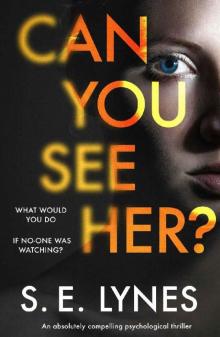 Can You See Her?: An absolutely compelling psychological thriller
Can You See Her?: An absolutely compelling psychological thriller The Housewarming: A completely unputdownable psychological thriller with a shocking twist
The Housewarming: A completely unputdownable psychological thriller with a shocking twist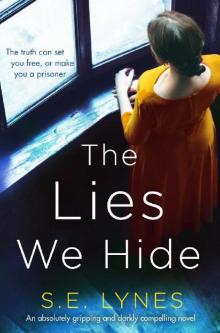 The Lies We Hide: An absolutely gripping and darkly compelling novel
The Lies We Hide: An absolutely gripping and darkly compelling novel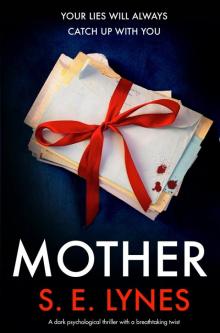 Mother
Mother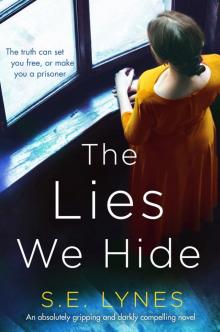 The Lies We Hide (ARC)
The Lies We Hide (ARC)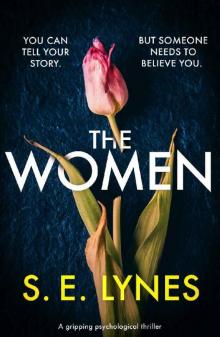 The Women: A gripping psychological thriller
The Women: A gripping psychological thriller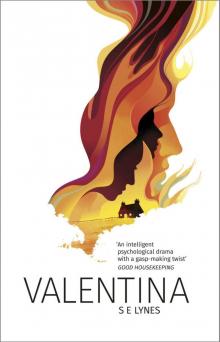 Valentina
Valentina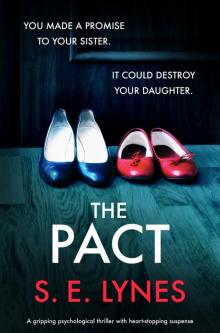 The Pact_A gripping psychological thriller with heart-stopping suspense
The Pact_A gripping psychological thriller with heart-stopping suspense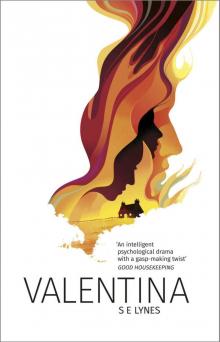 Valentina: A Hauntingly Intelligent Psychological Thriller
Valentina: A Hauntingly Intelligent Psychological Thriller